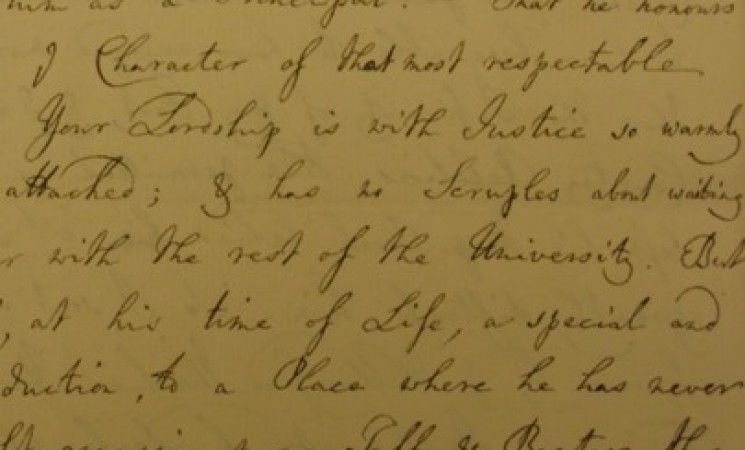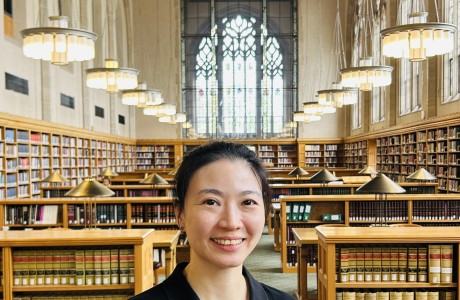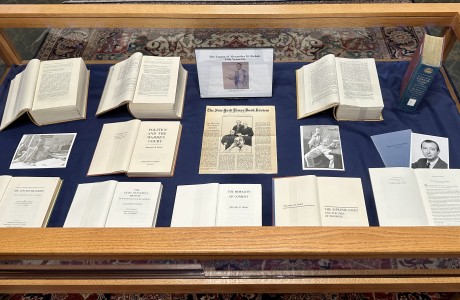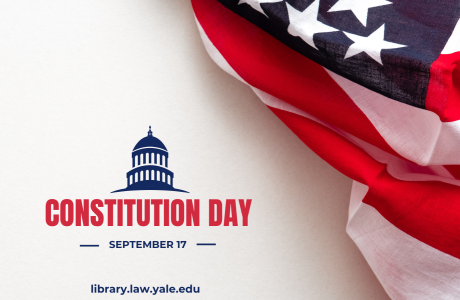The Taussig Collection: Blackstone Correspondence

The correspondence of major English judges, lawyers and legal academics is one rich area to explore in the Beinecke’s Taussig Collection of English legal manuscripts. These letters and letter collections offer wonderful insight into the lives and careers of leading English legal figures, and in some cases can form the basis of fuller biographical accounts.
William Blackstone (1723-80) is one of the great figures in English legal history. His correspondence in the Taussig Collection, while not extensive, is a valuable record of an important, transitional moment in his career, and complements the preeminent Blackstone Collection of printed works at the Lillian Goldman Law Library.
Born into a prosperous merchant family, Blackstone was educated at Pembroke and All Souls College, Oxford, and admitted to the Middle Temple in 1741 to become a barrister. After being called to the Bar, and taking a doctorate in civil law (1750), Blackstone worked in private practice in London, and at Oxford as an administrator, where he set his hand to reform. Although it is unclear when they were first offered, Blackstone also embarked on courses of legal lectures at Oxford, which drew income from fee-paying audiences. In 1758, Blackstone became the first Vinerian Professor of English Law there, a somewhat unhappy tenure until his formal resignation in 1765.
Fortunately for Blackstone, his growing reputation attracted some noble friends and patrons. With support, he was able to secure a seat in the House of Commons in 1761, while he cast around for other positions and appointments – some modest, others more prestigious – which would furnish income and further his career.
The Blackstone correspondence in the Taussig Collection largely dates to this key period, and shows the jurist – just prior to the publication of his great work, the Commentaries on the Laws of England (1765-69) – entreating friends and jockeying for professional positions. In a letter to his younger patron, Lord Shelburne, Blackstone asks for a position as Justice of Chester (OSB MSS 184, Box 32, #186, December 27, 1761), and he plainly confesses his wish to become an English judge (Box 32, #186, July 29, 1762). In December of 1762, Blackstone enlists Shelburne’s assistance to overturn the nomination of George Perrot for a position in the Exchequer of Pleas, which Blackstone at that moment coveted (Box 32, #189).
Aside from career ambitions, the letters shed fleeting light on English politics and on Blackstone’s administrative plans. In one, Blackstone hints at his ideas for curricular reform at Oxford, remarking that higher education should benefit (largely wealthy, upwardly mobile) laymen, rather than the “monastic” clergy for whom English education had been tailored for centuries (Box 32, #186, December 27, 1761). In another, Blackstone discusses the proposed appointment of an administrator for Oxford University Press, where Blackstone worked significantly for reform (Box 34, #268, November 17, 1764). For more on Blackstone and the OUP, see Mike Widener’s great recent post.
Together, the Blackstone letters from the Taussig Collection capture Blackstone in the midst of a dynamic decade, which not only saw the publication of his towering literary achievement, but also the fitful movements of a career in which Blackstone hoped to become a leading English judge.
For more on Blackstone’s life and correspondence, see the excellent book by Wilfrid Prest, William Blackstone: Law and Letters in the Eighteenth Century (Oxford, 2008), and his edition of Blackstone’s letters, The Letters of Sir William Blackstone, 1744-1780 (London, 2006).
– RYAN GREENWOOD, Rare Book Fellow



